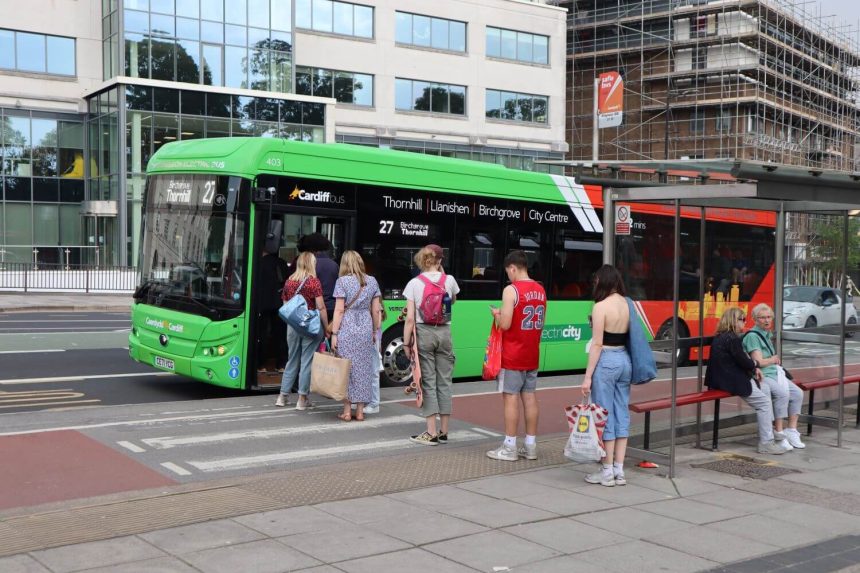Campaigners have reacted angrily after the House of Lords narrowly failed to pass an amendment to the forthcoming Bus Services (No.2) Bill which would appear to have prevented the installation of further “floating bus stops”.
During 80 minutes of debating on the topic on 2 April, peers threw out the proposed amendment (see below) moved by Lord Holmes of Richmond (Conservative) which would have required the Secretary of Transport for Transport to issue guidance that buses must stop “at the kerbside”.
The charity Guide Dogs has been among the bodies campaigning against the infrastructure, in which passengers have to cross a live cycle lane to reach the bus stop. Guide Dogs has called for a pause on the roll-out of further examples until more research is conducted and their safety can be guaranteed.
“(2A) The Secretary of State must issue guidance requiring—(a) buses to stop at the kerbside to allow all passengers to board from and alight directly to the pavement, and (b) stopping places to be designed such that all passengers can continue their journey without crossing a live cycle lane running through or on any part of the pavement.(2B) The organisations listed in subsection (6) must comply with the guidance issued under subsection (2A) when commissioning the design, construction or maintenance of a stopping place for a local service, or any facilities in the vicinity of a stopping place for a local service.” – Amendment 36 – disagreed
Labour peer Lord Blunkett succeeded in pushing through other amendments aimed at increasing the safety of persons with disabilities around bus stops. These included that the government must issue guidance on the provision of floating bus stops within three months of the Bill becoming law.
However, the outcome of the debate was not welcomed by some campaigners.
National Federation of the Blind UK Street Access Campaign Coordinator Sarah Gayton says: “It’s very clear that all floating bus stops need to be halted with immediate effect, regardless of the outcome of the vote in the House of Lords…
“Lord Holmes understood this and his were the only amendments which would have brought an immediate end to the dangers, chaos and inaccessibility that floating bus stops have created on bus routes with cycle lanes…
“It is unthinkable that Lord Blunkett, who sponsored Lord Holmes amendments, would submit what, in our opinion, appears to be late government-led amendments which do nothing to truly address the issue as it should be and then vote against Lord Holmes’ amendments.”
Among those present in the gallery was Sarah Leadbetter, a disability campaigner and guide dog user. She says: “It’s disgusting what happened with Lord Blunkett’s very late amendment, as this has stopped the halting of floating bus stops across England.
“We do not need any more assessments or tighter guidance. It is very clear these designs are not fit for purpose. We just need no more floating bus stops put in, so blind, partially sighted, disabled and older people can catch the bus and get their independence back.”
Cycling groups say floating bus stops and similar designs are necessary for the safety of bicycle users.
Simon Munk, Head of Campaigns and Community Development for the London Cycling Campaign, says his group is glad Lord Holmes’ amendment did not pass.
“Despite the claims made by some regarding floating bus stop designs, these are found all over Europe, and the evidence strongly suggests they’re safe and aren’t massively impacting disabled people’s journeys,” he says.
He adds that banning floating bus stops would harm take-up of cycling and calls for a “more constructive and evidence-based discussion over cycling, cycle tracks, buses and floating bus stops”, which would include “getting the design right” of the controversial form of bus stop infrastructure.
“Most people, particularly women and children, refuse to cycle if they don’t have a safe route separate from motor traffic on main roads,” he adds. “Banning floating bus stops would cut cycling rates and diversity, put people back in cars, and force those who keep cycling to mix with buses (because there is no other magic way to cycle past a bus stop), causing delays to buses and risking more collisions.”
The Bill, which is designed to put into effect the government’s plans to give local authorities more powers over bus services, is expected to move to the House of Commons over the period of the next month.



























